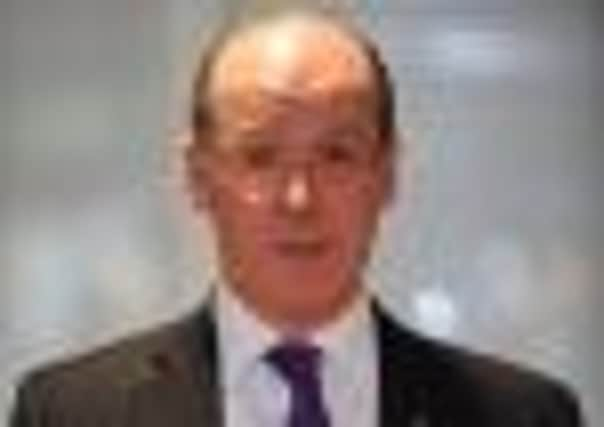Coalition relishes showdown with unions, claims John Swinney


Scotland’s finance secretary accused the coalition government of a “naked cash grab” with its proposed general levy on pension contributions.
Meanwhile, business leaders have warned that the biggest general strike in almost 30 years will have “significant costs” to the economy.
Advertisement
Hide AdAdvertisement
Hide AdSchools are set to close and hospital services will be dramatically cut during the 24-hour walkout by up to two million workers across the UK, including 300,000 in Scotland. Airlines have been asked to cut the number of passengers they fly to the UK’s busiest airports.
Public-sector workers, including firefighters, school dinner ladies, social workers, hospital cleaners and nurses, will all take part in the first nationwide strike for 25 years over changes to pension arrangements.
The Scottish Government is opposed to the changes in pension provision, but ministers were effectively forced into adopting them north of the Border after the Treasury threatened to cut Holyrood’s budget if the SNP did not comply.
Referring to the general levy on pension contributions, Mr Swinney said: “It is a naked cash grab by UK ministers, driven not by the need for sensible and fair long-term pensions reforms but instead driven by deficit reduction targets. What is deeply regrettable is the fact that UK ministers, from the Prime Minister downwards, actually appear to be relishing the prospect of strike action and confrontation with the trade unions.”
He urged UK ministers to take action which could help avert the strike and the “very significant disruption” it would cause to ordinary people.
“Members of the public right across Scotland will have their daily routines affected by the action that is planned,” he said.
David Watt, chief executive of the Institute of Directors, said there “won’t be a great deal of public support” for the strikers. He said: “The forecasts of delays of 12 hours for people coming into Heathrow are absolutely terrifying. The fact that schools are closed causes virtually all businesses significant problems, so there is a real concern. There is a genuine cost to it.”
There have been estimates of a £500 million blow to the economy, but Mr Watt said it was “impossible to estimate” the impact.
Advertisement
Hide AdAdvertisement
Hide AdA war of words raged between union leaders and UK ministers yesterday over who was to blame for the deadlock. Chancellor George Osborne said the current offer was a “good deal”.
He said: “I’m trying to give them a good decent pension for many, many years to come – much better than you could get if you were in the private sector these days.”
Trades Union Congress (TUC) general secretary Brendan Barber said the government should pause and reflect on how it had managed to “alienate its entire workforce”, while a senior minister urged nurses, teachers and civil servants to find out for themselves what the government’s reforms meant for their pensions.
Despite last-minute pleas from the government to call off the strike, unions pressed on with arrangements for marches, rallies, picketing and protests to be held across the UK.
Mr Barber said: “This will be the biggest strike for a generation. The government has managed to alienate its entire workforce. Even health service staff, who are very reluctant to strike, will be leaving their workplaces, although they have ensured proper emergency cover.
“Ministers must take notice of the strength of feeling of its workforce.”
Chief Secretary to the Treasury Danny Alexander denied union charges that the government was planning a “race to the bottom” on pensions, saying that “quite the opposite” was true.
He said: “I firmly believe that public-service workers deserve the very best pensions. That’s why we are making sure they remain so generous.”
Advertisement
Hide AdAdvertisement
Hide AdDeputy Prime Minister Nick Clegg said it was union bosses who were “wilfully misrepresenting” the government’s position.
The scale of disruption set to be caused by the strike became clearer when it was revealed that thousands of NHS operations and appointments were being cancelled and rescheduled because of action by NHS staff, from nurses to radiographers.
Increasing numbers of parents were told that their children’s schools would close, while the government has refused to rule out the army being brought in to guard Britain’s borders when UK Border Agency staff join the walkout.
The government is continuing to insist that a “generous” new offer was made to union leaders three weeks ago in an effort to resolve hostilities. Ministers say that they are still waiting for a proper response.
Speculation has also increased that strike laws could be strengthened as a result of the dispute, and that the latest pensions offer could be withdrawn if there is no deal soon.
The mass action has been triggered by UK government proposals to bring the public-sector retirement age in line with the new state pension age of 66, rather than the current 60, by 2020.
The proposals include a rise in employee contributions of 3 per cent, as public-sector pay remains frozen and with plans to link pension-pot payments to a lower rate of inflation.
The Scottish Government has previously asked the Treasury to delay an increase in public-sector contributions until a pay freeze was lifted.
Advertisement
Hide AdAdvertisement
Hide AdThat prompted a warning from Mr Alexander that every month’s delay in implementing the increase would lead to an £8.4m reduction in the Scottish Government’s budget.
General secretary of the Scottish TUC, Grahame Smith, said there were no direct talks scheduled to resolve the dispute.
He said: “Negotiations aren’t ongoing. The last time the government spoke to the trades unions was on 2 November.”
Brian Strutton, national officer of the GMB, said: “Only a last-minute breakthrough in negotiations can stop the strike, but that isn’t going to happen if we are not even meeting. I think the public can work out that increasingly wild government statements to the media while refusing to talk to us face-to-face tells its own story.”